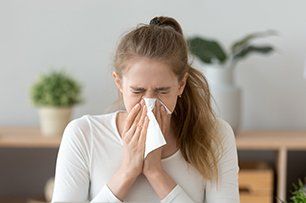Asthma and Allergy Information
Most Insurance Accepted | Locally Owned | Wi-Fi Available
Most Insurance AcceptedLocally OwnedWi-Fi Available
Contact Us
What Is Allergy Testing?
If you have an allergy, you are reacting to a particular substance. Any substance triggering an allergic reaction is called an allergen. To determine which specific substances are triggering your allergies, Northeastern Asthma & Allergy Associates will safely and effectively test your skin or sometimes your blood using tiny amounts of commonly troublesome allergens.
Allergy tests are designed to gather the most specific information possible, so your doctor can determine what you are allergic to and provide the best treatment.
Contact Information
Who Can Be Tested for Allergies?
Adults and children 14 years of age and older can be tested if they have symptoms that suggest they have an allergic disease. Allergy symptoms can include:
- Respiratory symptoms: itchy eyes, nose, or throat; nasal congestion, runny nose, watery eyes, chest congestion, or wheezing
- Skin symptoms: hives, generalized itchiness, or atopic dermatitis
- Other symptoms: anaphylaxis (severe life-threatening allergic reactions), abdominal symptoms (cramping, diarrhea) consistently following particular foods, and stinging insect reactions other than large local swelling at the sting site
Generally, inhaled allergens such as dust mites and tree, grass, or weed pollens will produce respiratory symptoms. Ingested (food) allergies will produce skin and/or gastrointestinal symptoms or anaphylaxis, but both types of allergens (ingested and inhaled) can produce the spectrum of allergy symptoms.

Which Allergens Will I Be Tested For?
If your physician makes a diagnosis of allergies, it means that one or more allergens are causing your allergic reaction. This may include itching, swelling, sneezing, wheezing, and other symptoms. Your symptoms are probably caused by one of these common allergens:

Types of Allergy Tests
Prick Technique:
The prick technique involves introducing a small amount of allergen into the skin by making a small puncture through a drop of the allergen extract. If you have an allergy, the specific allergens that you are allergic to will begin a chain reaction in your body.
People with allergies have an allergic antibody called IgE (immunoglobulin E) in their body. This chemical, which is only found in people with allergies, activates special cells called mast cells. These mast cells release chemicals called mediators, such as histamine, the chemical that causes redness and swelling.
With testing, swelling occurs only where the tiny amount of allergen to which you are allergic has been introduced. If you are allergic to ragweed pollen but not cats, the spot where the ragweed allergen touched you will swell, itch, and form a dime-sized hive. The spot where the cat allergen scratched you will remain normal. This happens quickly in and on your body.
Test results are available within 15 minutes of testing, so you won't wait long to find out what is triggering your allergies. And you won't have any other symptoms besides the slightly swollen, small hives where the test was done. This goes away within 30 minutes.
Intradermal: This involves injecting a small amount of allergen under the skin with a syringe. This form of testing is more sensitive than the prick skin test method and may be used if the prick skin tests are negative.
Other Allergy Testing Techniques
Scratch tests:
The term "scratch test" refers to a technique not commonly used at the present. It involves abrading or scratching the skin and then dropping the allergen on the abraded site.
Who Can Be Tested for Allergies?
Adults and children 14 years and older can be tested for allergies. Because different allergens bother different people, your allergist will take your medical history to determine which test is the best for you. Some medications can interfere with skin testing. Antihistamines, in particular, can inhibit some of the skin test reactions. Use of antihistamines should be stopped one to several days prior to skin testing.
Blood (RAST) Test:
Sometimes, your allergist / immunologist will do a blood test called a RAST (radioallergosorbent) test. This test involves drawing blood and will cost more. The results are not available as rapidly as skin tests. RAST tests are generally used only for cases in which skin tests cannot be performed, such as on patients taking certain medications or those with skin conditions that may interfere with skin testing.
Adults and children of any age can be tested for allergies. Because different allergens bother different people, your allergist will need your medical history to determine which test is the best for you. Some medications can interfere with skin testing. Antihistamines, in particular, can inhibit some of the skin test reactions. Use of antihistamines should be stopped one to several days prior to skin testing.
When Should You See an Asthma Specialist?
Allergy testing by a doctor may be helpful in patients with anaphylaxis (systemic allergic reaction), asthma, allergic pneumonia, conjunctivitis, cough, dermatitis, drug allergy, food allergy, insect allergy, rhinitis, sinusitis, urticaria, and angioedema. Your doctor can provide you with more information on allergy testing.
Call 860-928-5864 today to set up your consultation
Free parking
